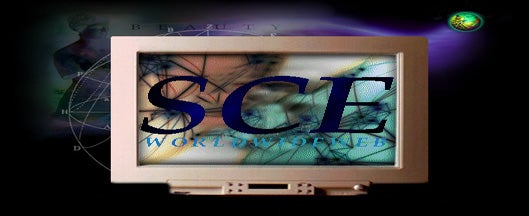

This section will list upcoming SCE events, especially conferences, and announcements regarding official SCE activities.
What's on the SCE Open Bulletin Board?
Upcoming SCE Events:
Midwest M/MLA Conference in Chicago.
MLA Conference in Toronto Exeter Conference
- The Netly News (http://netlynews.com/)
- November 20, 1997
The following electronic mailing recently came to the attention of the SCE: Copyrights and Wrongs By Declan McCullagh (declan@well.com) If you think nothing of trading copyrighted software with your friends, think again. A new law passed by Congress will make even casual copyright breach a crime punishable by a fine of up to $250,000 and five years in a federal prison. While you're cooling your heels in Club Fed, you'll have plenty of time to consider your misdeeds -- which in this case could have been making just three copies of Adobe Photoshop (cost: $389). The legislation covers anyone who copies compact discs, videocasettes or computer software worth at least $1,000. The No Electronic Theft Act, which President Clinton is expected to sign later this month, will be the first law in the history of the U.S. to imprison copiers looking to save (not make) a few bucks. The President's signature will come not a nanosecond too soon for the software and recording industry lobbyists who have demanded this legislation for years. "The function of the criminal copyright law is to deter people from commercial-scale piracy, just as it is to penalize those who prosecutors take to court," says Mark Traphagen, vice president of the Software Publishers Association, the software industry's largest trade organization. On Tue, 25 Nov 1997 gurakl@epx.cis.umn.edu wrote: See esp. the section about fair use. --Laura Date: Tue, 25 Nov 1997 10:55:02 -0400 From: Lauren Gelman <gelman@ACM.ORG November 25, 1997 President William J. Clinton 1600 Pennsylvania Ave., NW Washington, DC 20500 Dear President Clinton: The Association for Computing's U.S. Public Policy Committee believes that the "No Electronic Theft Act" (H.R. 2265), which is now before you, does not adequately reflect the nature of the new digital environment and will have a negative impact on the rich scientific communications that have developed on the Internet in many fields, including computer science. For this reason, we are asking you to veto the legislation. We agree that copyright holders have a legitimate need to protect their intellectual property. However, we are concerned that the bill was rushed through both Houses of Congress without careful consideration of its unintended consequences. We are concerned the Bill may: * Restrict scientists and other professionals from making their research available on the Internet for use by colleagues and students. Most scientists do not own the copyright on their own materials. Instead, that copyright ownership is retained by the scientific journal which peer-reviews and publishes the research. Under the No Electronic Theft Act, an author who posts their research on the Internet, and whose documents are frequently read on-line, could be subject to criminal prosecution. If the bill becomes law, scientists may have to choose between having their work peer-reviewed or making it widely available. * Criminalize the transfer of information that is currently protected under the U.S. 'fair use' doctrine. Copyright law is derived from the U.S. Constitution and is intended to advance "science and the useful arts." The fair-use doctrine protects reading and nonprofit copying and thus allows scientists and educators to openly exchange information. H.R. 2265 does not explicitly protect the "fair use" privilege which makes this open exchange of scientific information possible. * Chill free speech in universities and research labs. The terminology used in the Bill, including "willingly" and "for profit," are not defined; it is unclear what the parameters of a criminally prosecutable copyright infringement are. As a result, it is likely that many institutions will mandate that all copyrighted documents be removed from the net to avoid having to defend copyright infringement prosecutions. We hope that you will veto this measure and ask your staff to work with Congress during the next session to develop more sensible legislation. Sincerely, Dr. Barbara Simons Chair, U.S. Public Policy Committee Association For Computing The Association for Computing (ACM) is the largest and oldest professional association of computer scientists in the United States. ACM's U.S. Public Policy Committee (USACM) facilitates communication between computer scientists and policy makers on issues of concern to the computing community. cc: Vice President Albert Gore, Jr. Ira Magaziner, Senior Adviser to President Brian Kahin, Office of Science Technology and Public Policy. Henry J. Hyde, Chair, House Judiciary Committee John Conyers, Jr., Ranking Member, House Judiciary Committee Howard Coble, Chair, Courts and Intellectual Property Subcommittee, House Judiciary Committee Orrin G. Hatch, Chair, Senate Judiciary Committee Patrick J. Leahy, Ranking Member, Senate Judiciary Committee John Ashcroft, Chair, Constitution, Federalism and Property Rights Subcommittee, Senate Judiciary Committee Mike DeWine, Chair, Antitrust, Business Rights and Competition Subcommittee, Senate Judiciary Comittee Representative Virgil H. Goode Representative Barney Frank, House Judiciary Committee Representative Christopher Cannon, House Judiciary Committee Representative William Delahunt, House Judiciary Committee Representative Elton Gallegly, House Judiciary Committee Representative Bob Clement Association for Computing, + http://www.acm.org/usacm/ Office of U.S. Public Policy * +1 202 544 4859 (tel) 666 Pennsylvania Ave., SE Suite 302 B * +1 202 547 5482 (fax) Washington, DC 20003 USA + gelman@acm.org To subscribe to the ACM Washington Update, send e-mail to: listserv@acm.org with "subscribe WASHINGTON-UPDATE name" (no quotes) in the body of the message.



